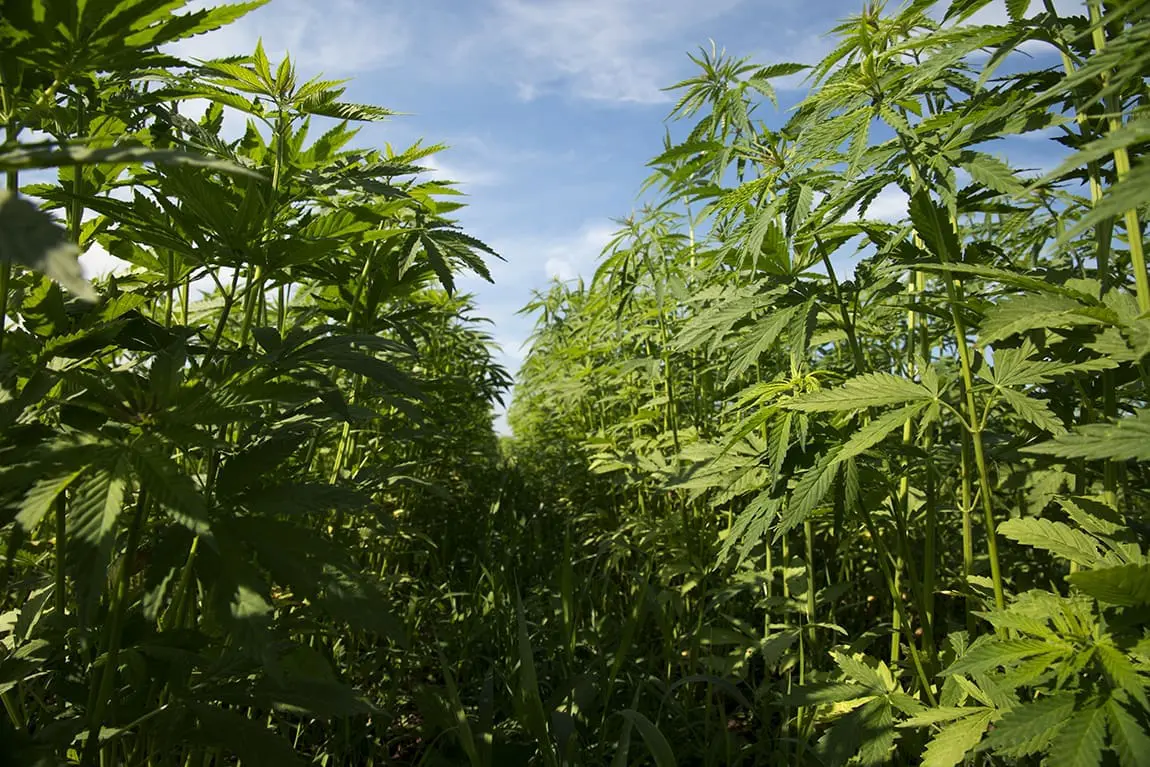Politics
Hemp Could Have More THC Under New Congressional Bill That Aims To Fix Regulatory Issues For Expanding Industry

A new congressional bill seeks to build upon the federal legalization of hemp by providing cannabis businesses with additional flexibility that’s been sought after by industry stakeholders, as well as remove a controversial ban on market participation by people with prior drug convictions.
Rep. Chellie Pingree (D-ME) filed the Hemp Advancement Act on Tuesday. The legislation would provide several critical reforms, including by increasing the legal THC threshold for hemp products from the current 0.3 percent to 1 percent on a dry weight basis.
It could additionally, however, upend the growing market for delta-8 THC products by officially counting the isomer in allowable THC amounts.
It would also address an issue related to THC levels for in-process hemp.
NEWS: I just introduced the Hemp Advancement Act because the industry has been stunted by unworkable & overly complicated regulations.
These 3 commonsense changes would create a clear path forward for the nation's hemp farmers & producers ⤵️🌿 pic.twitter.com/P4QU1OZXBL
— Congresswoman Chellie Pingree (@chelliepingree) February 8, 2022
Businesses previously raised concerns about the THC threshold prescribed under existing federal statute because the process of hemp extraction can temporarily raise the THC content in a crop in a way that could make them liable for enforcement action. Under Pingree’s bill, in-process hemp would not be subject to any THC limits as long as the final product doesn’t exceed one percent.
The proposal would also remove a requirement under the 2018 Farm Bill that the crop can only be tested at laboratories registered by the Drug Enforcement Administration, a prohibitive policy that the lawmaker highlighted with a supplementary map showing the limited number of such facilities across the country.
“There are insufficient testing facilities. Right here in Maine, we don’t have one at all—and there’s two that cover all of New England,” Pingree told Marijuana Moment in a phone interview on Monday, adding that there are non-DEA-certified labs that are “perfectly capable of doing this.”
“To eliminate this DEA requirement would take away one more obstacle that farmers are currently facing,” she said. “Again, it takes it out of this realm of, you know, ‘this is [about] dealing drugs.’ This is an agricultural crop. Let’s assess it for appropriate reasons, but we don’t have to make it so sinister that everything has to be done by the DEA.”
Did you know there are just *two* DEA testing labs in all of New England and none in Maine? My #Hemp Advancement Act would ensure growers have more testing options that are closer to home.
Read more in today's @PressHerald 🪴 https://t.co/HRZ03K3D6z pic.twitter.com/iN9ZCnnPL2— Congresswoman Chellie Pingree (@chelliepingree) February 8, 2022
Finally, the legislation would remove a provision of the Farm Bill that prohibits participation in the hemp industry for people who’ve faced drug-related felony convictions in the past 10 years. Advocates have argued that the policy unnecessarily perpetuates racial disparities by excluding people from communities that have been disproportionately impacted by cannabis prohibition.
“This ban treats hemp as if it was a controlled substance, and that people are trying to somehow engage in drug dealing or nefarious activities,” Pingree said. “As we all know, hemp is an agricultural crop, it has a whole different purpose. And like all agricultural enterprises right now, we have a labor shortage.”
—
Marijuana Moment is already tracking more than 1,000 cannabis, psychedelics and drug policy bills in state legislatures and Congress this year. Patreon supporters pledging at least $25/month get access to our interactive maps, charts and hearing calendar so they don’t miss any developments.
![]()
Learn more about our marijuana bill tracker and become a supporter on Patreon to get access.
—
“To prohibit people with what seems like a very antiquated, backwards rule, it’s just damaging to the industry and for those individuals who want to participate,” the congresswoman said. “I hope we see smooth sailing on eliminating that ban.”
The bill is being backed by more than a dozen major hemp and cannabis groups, including the U.S. Hemp Roundtable, Americans for Safe Access and Hemp Industries Association.
Pingree said that she’s had conversations with colleagues on both sides of the aisle and feels the legislation will enjoy the same level of bipartisan support that the hemp legalization provision of the 2018 Farm Bill saw.
“I hope that we have plenty of bipartisan buy-in because there was so much enthusiasm in the beginning,” the congresswoman said. “And in many states around the country—places like Maine, places like Kentucky— there’s been a lot of interest in growing hemp and increasing a large number of farmers who want to participate if they can remove the obstacles. I feel confident that we’ll have bipartisan support.”
She said that while she’d like to see the standalone legislation taken up in committee, she also expects it to drive conversations and inform policy as lawmakers get to work on drafting the 2023 Farm Bill, negotiations for which are expected to begin later this year.
“At the very least, my goal is to make sure that that language is included in one form or another in the Farm Bill because that’s, I think, where we have the greatest opportunity to make some significant change,” Pingree said.
With respect to the increased THC threshold for hemp products, the bill would also make it so the new one percent THC limit would include not just the most well-known psychoactive component, delta-9 THC, but also variants like delta-8 and delta-10 that are lesser known but are increasingly available in markets where cannabis isn’t currently legal.
By statutorily including the isomers in the definition of THC, the legislation could upend the market for products containing them.
The proposed policy change is meant “much more to deal with the challenges that farmers are facing during testing because hemp is an agricultural product,” Pingree said.
Jonathan Miller, general counsel for the U.S. Hemp Roundtable, told Marijuana Moment in a phone interview last week that Pingree’s overall bill is “very important as a way to redress some of the flaws of the 2018 Farm Bill and learn the lessons from the last four years of hemp growing and improve upon them.”
“Really, we think it’s a really great kickstart for the industry,” he said.
Commenting on the proposed increased total THC threshold that includes cannabinoids other than delta-9, Miller said the issue “is unclear.”
“It was something that none of us who were involved in the 2018 Farm Bill really knew about to any degree, and has been seized as a loophole,” he said. Even DEA has signaled that, at the federal level at least, delta-8 THC is not a controlled substance at this time.
Pingree first previewed the new legislation in September at an event with the U.S. Hemp Roundtable.
Last year, Reps. Kurt Schrader (D-OR) and Morgan Griffith (R-VA) filed a separate bill aimed at allowing hemp and CBD derived from the crop to be marketed and sold as dietary supplements. That’s been another major source of controversy, as the current lack of regulations from the Food and Drug Administration (FDA) is viewed as a central barrier for the hemp industry’s growth.
In the Senate, Sens. Ron Wyden (D-OR), Rand Paul (R-KY) and Jeff Merkley (D-OR) introduced a bill that would similarly exempt “hemp, hemp-derived cannabidiol, or a substance containing any other ingredient derived from hemp” from certain restrictions that have blocked the emergence of legal consumable hemp products while the FDA has slow-walked regulations.
Paul also filed separate legislation last year that would triple the concentration of THC that hemp could legally contain while addressing multiple other concerns the industry has expressed about the federal regulations.
More recently, the U.S. Department of Agriculture (USDA) announced last month that it will be partnering with Cornell University on a webinar series to promote education about hemp as the industry evolves.
The agency also recently said that it has taken steps to improve insurance policies for hemp businesses, making them more flexible in response to stakeholder feedback.
USDA has taken a number of steps to align hemp insurance policies with those of other lawful crops since the plant was federally legalized under the 2018 Farm Bill, consistently seeking out input from stakeholders as the industry matures.
In 2020, for example, the department made it so hemp farmers can qualify for Multi-Peril Crop Insurance, in addition to several other coverage programs for which the crop is now eligible.
As part of its overall outreach, the department launched a large-scale survey in August to gain insight into the hemp market that’s emerged.
After requesting permission from the White House last year to conduct the survey of about 20,000 hemp farmers, the agency’s National Agricultural Statistics Service recently made response forms available to be filled out via mail or online.
USDA is asking questions about plans for outdoor hemp production, acreage for operations, primary and secondary uses for the crop and what kinds of prices producers are able to bring in. The questionnaire lists preparations such as smokeable hemp, extracts like CBD, grain for human consumption, fiber and seeds as areas the department is interested in learning about.
The department announced plans in 2020 to distribute a separate national survey to gain insights from thousands of hemp businesses that could inform its approach to regulating the industry.
That survey is being completed in partnership with National Association of State Departments of Agriculture and the University of Kentucky. The department said it wanted to learn about “current production costs, production practices, and marketing practices” for hemp.
There’s still much to learn about the burgeoning market, even as USDA continues to approve state regulatory plans for the crop. Recently, the agency approved a hemp plan submitted by Colorado, where officials have consistently insisted that the state intends to be a leader in the space.
While USDA’s final rule for hemp took effect on March 22, 2021, the agency is evidently still interested in gathering information to further inform its regulatory approach going forward. Industry stakeholders say the release of the final rule is a positive step forward that will provide businesses with needed guidance, but they’ve also pointed to a number of policies that they hope to revise as the market matures such as USDA’s hemp testing requirements.
The federal Small Business Administration’s Office of Advocacy expressed a similar sentiment in a blog post last February, writing that it is “pleased with some of the changes that [USDA] has made to the rule, as they offer more certainty and are less burdensome to small farmers,” but “some concerns remained unaddressed in the final rule.”
USDA said last year that it is teaming up with a chemical manufacturing company on a two-year project that could significantly expand the hemp-based cosmetics market.
Meanwhile, the U.S. Department of Energy (DOE) announced in August that it is sponsoring a project to develop hemp fiber insulation that’s designed to be better for the environment and public health than conventional preparations are.
Read the text of the new hemp reform bill below:
Wisconsin Governor Vetoes GOP Bill To Increase Marijuana Extraction Penalties
Photo courtesy of Brendan Cleak.



